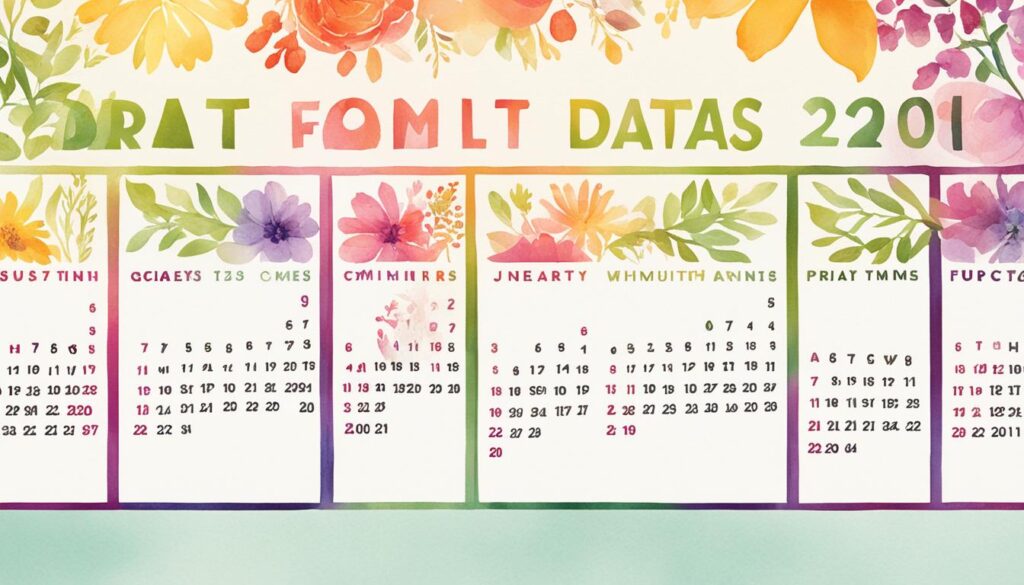
Deciding to start a family is an exciting journey. Knowing the best time to get pregnant is key. The ideal time can vary a lot from one couple to another. Looking at the best months for fertility can help a lot.
Many things affect when couples decide to conceive. These include their health, personal situations, and the season. Over time, trends have shown when most people get pregnant. But, having a child is joyful in any season.
This article will explore the science behind the best times to conceive. We’ll also look at how social and cultural views affect when people plan to have a baby.
Key Takeaways
- Choosing the best time to conceive is subjective and varies per couple.
- Optimal fertility months can be influenced by health and lifestyle factors.
- Statistical data on peak pregnancy times can inform family planning.
- Understanding seasonal impacts can help in making informed decisions.
- Welcoming a child is a joyful experience, regardless of timing.
The Science Behind ‘Optimal’ Fertility Seasons
Knowing when you’re most fertile can boost your chances of getting pregnant. The cycle of fertility is complex, with ovulation being key for conception. Women ovulate 12 to 16 days before their period, making it a great time to try to conceive.
Understanding the Fertility Cycle
Every month, the body gets ready for pregnancy with hormonal changes. When ovulation happens, an egg is released and can be fertilized for about 24 hours. Couples should focus on this time to increase their chances of getting pregnant.
Factors Influencing Conception Chances
Many things can affect getting pregnant, like age, health, lifestyle, and timing. Couples who have sex often without birth control have a better chance of getting pregnant. In fact, 80% of couples may get pregnant within a year. Knowing when you’re most fertile helps couples plan better.
Statistical Insights on Seasonal Birth Trends
Studies show interesting trends in birth rates and when people conceive. In the U.K., the most babies are born from November 25 to December 2, leading to a peak in August and September births. These months might be better for fertility due to the weather, adding to the link between seasons and fertility.
Best Time of Year to Get Pregnant
Choosing the best time to get pregnant can change the whole experience from start to after the baby is born. Each month has its own good and bad points that can affect a couple’s decision. Knowing these can help plan for the best outcomes.
Pros and Cons of Each Month
Every month has its own pros and cons for getting pregnant. Here’s a summary of how timing can change pregnancy experiences:
| Month | Pros | Cons |
|---|---|---|
| January | New beginnings, cozy indoor months | Winter blues, cold weather discomfort |
| February | Romantic vibes around Valentine’s Day | Flu season peaks |
| March | Spring renewal, warmer weather | Allergies may begin |
| April | Vibrant nature, hopeful mood | Unpredictable weather changes |
| May | Outdoor activities, longer days | Seasonal allergies |
| June | Summer festivities give joy | Heat discomfort for late pregnancy |
| July | High energy and fun-filled days | Possible complications from heat |
| August | Stable weather, vacations | Hot temperatures affecting comfort |
| September | Back-to-school energy, cooling weather | Transition period may bring stress |
| October | Beautiful fall colors, fun festivities | Flu season begins |
| November | Holiday spirit brings togetherness | Cold and winter preparation can cause strain |
| December | Family gatherings, joyful atmosphere | End-of-year stress and challenges |
Popular Conception Windows and Their Timing
Many couples aim for late November to early December to conceive. The holiday season brings people together, making it a cozy time. This period is also when many people are most fertile, making it a popular choice for those wanting to conceive. Planning ahead can lead to a smoother pregnancy and birth experience.
Seasonal Factors Affecting Fertility
Understanding how the environment affects our reproductive health helps us find the best times to conceive. Seasonal changes can greatly affect when people are ready to have children. They mix biological and social factors together.
The Role of Temperature and Sunlight
Temperature has a big impact on fertility. High heat can lower sperm count, making it harder for men to conceive. But, more sunlight can help women. It can balance hormones and boost fertility chances.
This shows why we should think about the weather when planning to have a baby.
Cultural Seasons and Their Impact on Family Planning
Culture also plays a big part in when people plan to have children. Work, school, and holidays affect their choices. People might want to have a baby during certain times of the year.
This shows how personal goals and social norms influence when people are ready to have children. It adds to the complexity of how seasons affect fertility.
Monthly Breakdown of Conception Timing
Understanding when to conceive can greatly affect the health of both the mother and the baby. Each month has its own factors that can impact health and well-being. This knowledge helps parents plan for the best months to conceive.
Considerations for Conceptions in Each Month
Every month has its own pros and cons for fertility and health. Here are some key points for each month:
- January: Conceptions lead to autumn births, often aligning with school enrollment for children.
- February: Winter conditions might limit outdoor activities for mothers, impacting health during pregnancy.
- March: As spring approaches, increased sunlight can enhance mood and energy levels.
- April: Allergies may increase, but the warmer weather can benefit overall well-being.
- May: Conceptions might raise awareness of health implications due to flu season overlap.
- June: Longer days can provide a more active lifestyle, boosting physical health.
- July: Summer vacations promote relaxation, which can positively influence maternal health.
- August: Heat waves might be uncomfortable but can lead to a vibrant outdoor life.
- September: Early school schedules encourage preparations for new family dynamics.
- October: Fall festivities can positively influence mental health during pregnancy.
- November: Colder weather encourages family bonding, but sickness rates may rise.
- December: The holiday season can create both joy and stress for expecting mothers.
Health Implications for Different Times of the Year
The timing of conception affects the health of both the mother and the baby. Research shows that colder months may increase the risk of respiratory illnesses. Choosing the best months to conceive helps couples plan with health in mind.
Environmental factors like illnesses, nutrition, and mental health changes also play a big role in pregnancy. These factors can shape the pregnancy journey.

Social Perspectives on Conception Timing
Many mothers talk about when they got pregnant. They think about what feels right for them, their family, and their lifestyle. These conversations show many views on the best times to conceive. Some moms like to plan their pregnancies with big family events or seasonal traditions. This makes them happier and helps their mental health.
Motherhood Experiences Through the Seasons
Seasons change how mothers feel and make decisions about getting pregnant. Many women pick spring or early summer to plan their pregnancies. They like the feeling of new life and energy during these seasons. This can make them feel happier and help their mental health.
On the other hand, winter can be tough. The cold and isolation can make moms feel stressed and alone.
Community Insights and Trends on Timing
What others think can influence our choices. Social media shows how different generations think about planning families. Some groups pick certain months for special reasons, like holidays or cultural events. These talks help us see how we’re all connected in our family planning decisions.
| Season | Perceived Benefits | Potential Challenges |
|---|---|---|
| Spring | Renewal and optimism | Allergy impacts |
| Summer | Longer days and social events | Heat-related discomfort |
| Autumn | Family gatherings | Transition into colder months |
| Winter | Cozy family time | Isolation and seasonal mood shifts |
Conclusion
Looking into the best time to get pregnant, we see that each couple has their own path. Their health, feelings, and life situations play a big part in when they decide to start a family. Even though science points to certain times as ideal, it’s important to know what’s best for you and your partner.
We’ve talked about how things like the environment and culture affect when people think is the best time to have a baby. What works for one couple might not work for another. It’s key to remember that family planning is complex and every choice is special.
Whether you’re aiming for a certain time of year or going with your gut, every couple’s journey to having a baby is unique. By accepting this, we can appreciate the journey more. This way, we can make choices that feel right for us, celebrating the importance of our timing.
FAQ
What is the best time of year to get pregnant?
The best time to get pregnant varies for everyone. Things like your health, personal life, and the season matter. But, many couples are happy to conceive at any time.
How does the fertility cycle affect my chances of conception?
Knowing about the fertility cycle is important. Ovulation is key for getting pregnant. You’re most likely to get pregnant around ovulation, which happens 12 to 16 days before your period. Having sex during this time can boost your chances.
Are there peak times for conception based on statistical trends?
Yes, studies show the best times to conceive in the U.S. are from November 25 to December 2. This is when many babies are born in August and September. These trends can help couples plan for the best fertility months.
What are the pros and cons of conceiving in different seasons?
Each season has its own good and bad points. Winter might be cozy but recovery after having a baby could be tough during flu season. Summer could start your baby’s life full of energy but might be hot.
How do environmental factors like temperature and sunlight affect fertility?
Sunlight can help women’s hormones and boost fertility. But, too much heat can hurt sperm production and reproductive health. So, think about the season when planning to conceive.
How can the timing of conception impact my child’s health?
When you conceive can affect your health and your baby’s health at birth. Babies born in some months might face health issues due to seasonal illnesses. So, planning carefully is key.
How do social perspectives shape conception timing?
Social views greatly influence when couples choose to have a baby. Many moms prefer certain times based on family events, lifestyle, and community. These choices can shape the birthing experience.
Is there a fertility calendar I can reference?
There isn’t a single fertility calendar for everyone. But, tracking ovulation and seasonal trends can help find the best times to conceive. This approach can lead to better planning for pregnancy.




